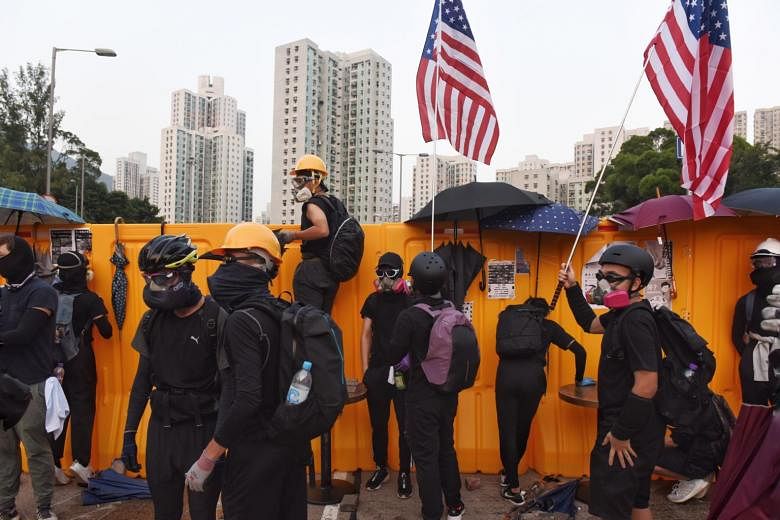WASHINGTON - The escalating violence in Hong Kong is spurring the United States Congress to push harder for a law that would support pro-democracy protesters, a rare bipartisan momentum that stands in contrast to President Donald Trump's relative silence on the issue.
Senators are doubling their efforts to push for a vote on the Hong Kong Human Rights and Democracy Act. The Bill would require an annual certification of whether Hong Kong remains sufficiently autonomous, thereby discouraging Chinese encroachment of the city's autonomy.
Republican Senator Marco Rubio of Florida wrote on Twitter that "very significant" progress had been made on Wednesday (Nov 13) on passing the Bill, without giving more details.
More than a third of the Senate has signed on to the Bill, and the next hurdle it needs to clear is for Senate leader Mitch McConnell, who controls the legislative agenda, to allow it to come up for debate and vote.
Mr Rubio warned that any further Chinese action to curtail Hong Kong's autonomy would risk censure by the US, in a statement he released with Democrat Jim McGovern of Massachusetts on Wednesday.
Both are co-chairs of the Congressional-Executive Commission on China, which monitors human rights and the rule of law in China.
Said the statement: "The escalating violence in Hong Kong is extremely concerning and the premeditated attack on university campuses, where over 1,000 rounds of teargas were used, raises disturbing questions as to whether the Chinese government's strategy is to create more chaos and new protests."
It added: "We also urge the Chinese government to consider the likely costs of any additional measures to undermine Hong Kong's autonomy, including more political disruption, curtailed access to the global financial system, and new sanctions by the US and the international community."
Mr Trump, however, has stayed silent on the violent events of recent days, which saw fierce clashes between protesters and police across the city as schools were suspended.
Instead, the main response from the White House came from the State Department on Monday. It condemned violence on all sides and urged Beijing to honour its commitment to Hong Kong's autonomy.
The President's silence has nettled more vocal China critics, including Senate minority leader Chuck Schumer.
"We need to act on the tragedy unfolding in Hong Kong. Why is President Trump giving the Chinese Communist Party a free hand?" Mr Schumer wrote on Twitter on Tuesday.
Commenting on the difference in public stances, Dr Daniel Kliman of the Centre for a New American Security (CNAS) think tank, told The Straits Times: "In recent history, the US Congress has often been a more vocal champion of human rights in America's foreign policy than the executive branch.
"This dynamic has become especially pronounced under the Trump administration, though on Hong Kong, some senior US officials such as Vice-President (Mike) Pence and Secretary of State (Mike) Pompeo have called out China, even as the President has remained muted," said Dr Kliman, who directs the Asia-Pacific security program at CNAS.











